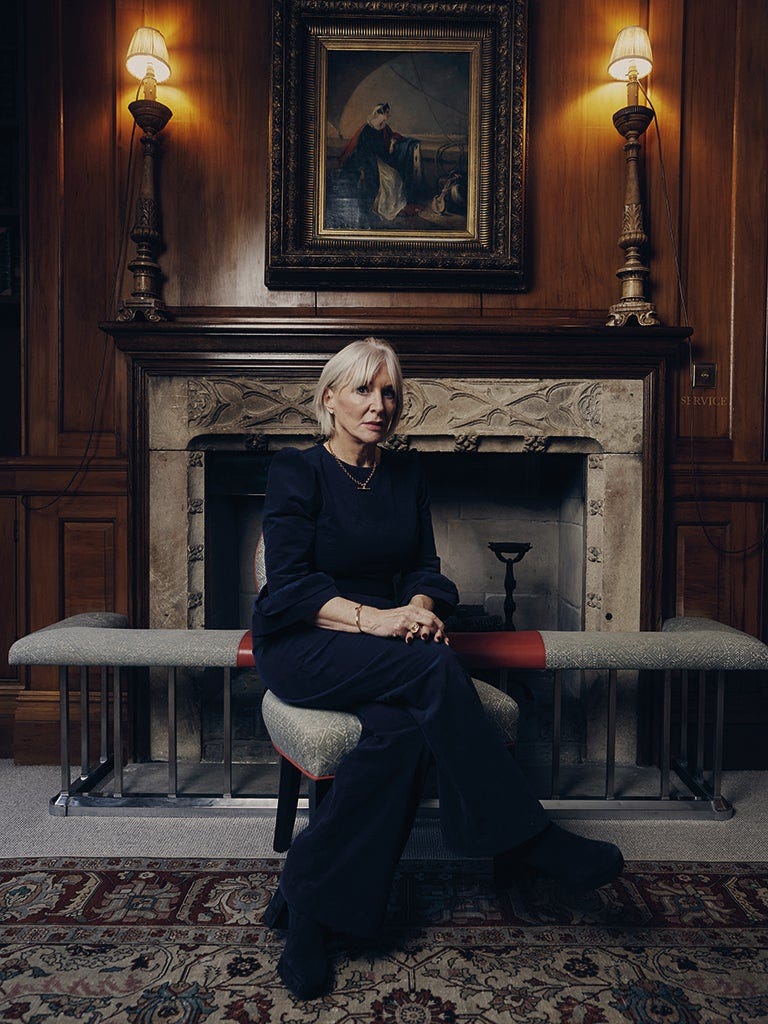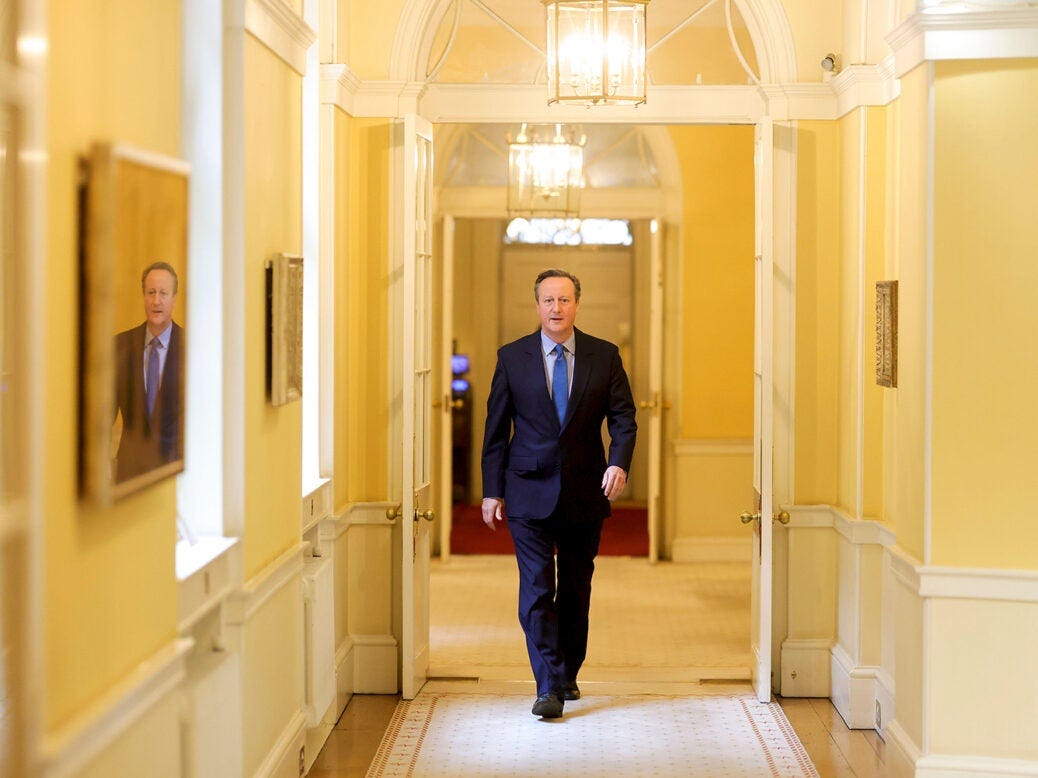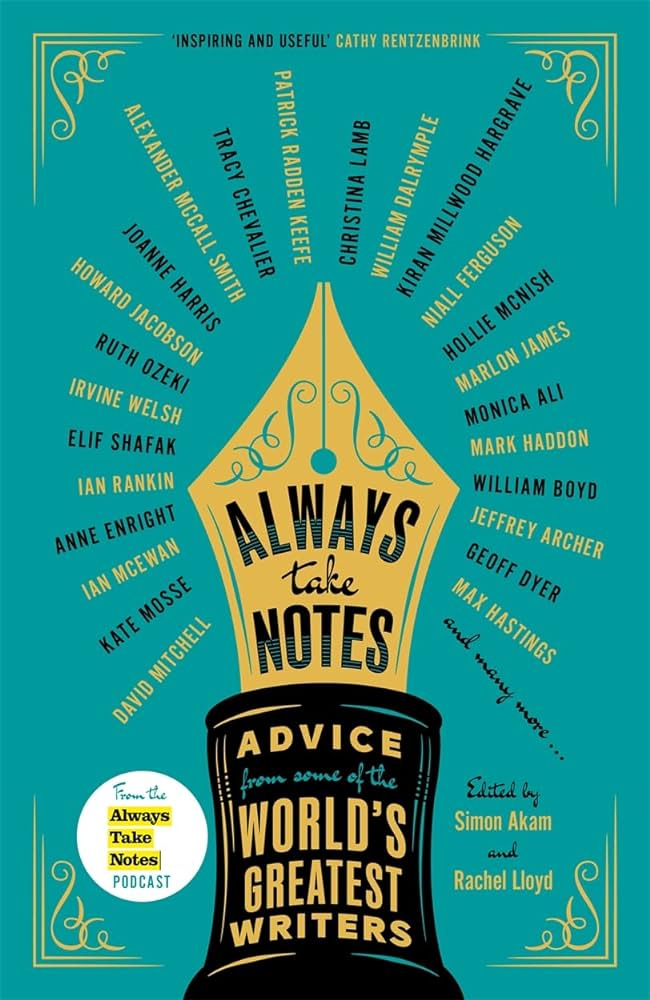The Saturday Read: In motion
Inside: Tory reinvention, a raft of interviews, Belgrade, and books of the year.
Good morning, and welcome to the Saturday Read, the New Statesman’s weekly guide to the best writing on ideas, politics, books and culture. This is Will, along with Pippa and Harry.
This week we have been covering a brutal war in the Middle East – have a read of Harry’s interview with Rashid Khalidi – and the return of David Cameron (sorry, Lord Cameron of Chipping Norton) not to mention the collapse of the government’s plan to fire asylum seekers out of a giant cannon all the way to the moon.
If this email cuts off midway, you can click here to read it online. If these pieces intrigue, perhaps you’d like to try a trial subscription to the NS. Read three articles after registering on our site. The first month of a digital subscription is then free. If you already subscribe to the NS, thank you for being a reader of ours.
1—“The Conservatives have all the power of Humpty Dumpty: words can mean whatever they want them to mean.”
The Tories’ have set the terms of British politics – to the common expense of all, writes Sam Earle. One concept on which they have alighted for 20 years is “common sense”, as this week’s risible appointment of a minister for it (Esther McVey) showcased yet again. HL
So, what does common sense mean? Just what Conservatives choose it to mean: deporting asylum seekers to Rwanda; crashing the economy; enriching their chums; letting Covid “rip”; slashing the public safety net so that poverty and homelessness soar; and so on. In the Tories’ self-image, none of this is ideological: only the left are guided by “ideas”. Conservatives simply draw from Britain’s customs, traditions and – of course – good old-fashioned “common sense”.
2—“When I say we love each other, I mean, as friends! I get sick to death of this ‘Oh, are you in love with Boris?’”
I interviewed Nadine Dorries this week. She was not at all what I expected, which is always an unsettling, though not unhappy experience for a journalist. Her book, The Plot, will become a classic document of this Tory era. WL
Returning to The Plot for a second time before interviewing Dorries, I realised that it did not really matter if this immensely entertaining book was true or not. It was pure Dada: the sort of surreal document that only appears when a tired regime is fading away, like the gas released by a dead body. It also proved that, embarrassingly for the lobby, she had managed to outmanoeuvre the nation’s political press corps.
Only Dorries has landed public-facing interviews with Johnson, who she always calls “Boris”, since he left Downing Street last July. There are seven interviews in The Plot alone, in addition to her TalkTV exclusive. Her Johnson is affable and dreamy, a massively overgrown schoolboy, always furtively liberating cheese from the family fridge. He quotes William Wordsworth and is never mean about anyone. Did he read The Plot before it was published?
3—“As someone who spent most of his 20s under his regime, it’s an era I know all too well.”
Clive Martin sketches the contours of the Cameron era: you know, that time it turns out we never left. HL
The defining British film of this time was Skyfall, which now appears like Cameron’s technocratic patriotism in washed out grayscale tones. The locales of Skyfall are not volcanic bunkers or Soviet monument cemeteries, but Shanghai skyscrapers, Aleppo-esque burnt-out cities and the National Gallery. Interestingly, director Sam Mendes now regrets some of his aesthetic decisions, telling the Hollywood Reporter, “I would think twice about having Bond stand on the rooftops of Whitehall, with the Union Jack flags in the breeze, given the last ten years of serial incompetence from the Conservative government.” Adding that, “We look back at that time as sort of a bizarre golden era.”
4—“In trying to strengthen his personal authority, Sunak has ignited yet another civil war.”
David Gauke and Andrew Marr weighed in on another baffling week for the government. First, David Cameron made a shock return to front-line politics. Then the Supreme Court torpedoed the Conservative Party’s plans to send asylum seekers to Rwanda. Oh, and Suella Braverman was sacked. Something to do with her tone, apparently, and not her utter failure to succeed by her own standards. WL
It must be a source of great frustration for the right that, for all their power, obtaining and maintaining the party leadership – or even a senior ministerial position – appears beyond them. They have much of the print media on their side, plus GB News now. The last general election was won through social conservatives enthusiastic about Brexit, making them a key part of the electorate. The Conservative Party membership now leans very firmly rightwards and can be relied upon to vote accordingly in leadership elections. And yet, when candidates of the right (or, to be more precise, with the support of the right) have won, they have soon imploded. Now the party is run by someone who is defying them and almost all the senior figures on the right are on the backbenches.
Sign up for our weekday political newsletter here:
Charging up and drilling down. Whilst today we’re mostly in oil & gas, we’re also working to roll out EV charging hubs and recently opened up the UK’s largest public hub in Birmingham. And, not or – that’s our approach. See how bp is backing Britain.
5—“But surely Russians have much more to offer Serbia than Instagrammable steak tartare?”
Lily Lynch reports from Belgrade, where an influx of Russian émigrés is changing Serbia. Displacement due to war, Lynch writes, is something Serbians know all too well. WL
But the Serbian government has also been eager to welcome Russian émigrés for other, more practical reasons. In short, the Russian newcomers are flush with cash, which Serbia desperately needs. Serbia also sees the influx of Russians as a potential antidote to the problem of demographic oblivion, as its own talented young people leave the country in droves for better opportunities in the West.
So eager was the Serbian government to receive the Russians that in April, draft legislation was put forth that would have granted citizenship to Russians and other foreigners after just one year of temporary residency. The European Commission balked at the proposal, fearing that the EU would receive a massive influx of thousands of foreigners armed with freshly minted Serbian passports (Serbia enjoys visa-free travel with the EU). Serbia succumbed to the EU’s pressures. For now, the plan to extend expedited citizenship to foreigners is on ice.
6—“Iranians think Israel will eventually disappear.”
Katie Stallard held a wide-ranging and considered conversation with John Jenkins, the former diplomat and recent NS contributor (“The Iran trap”), about Israel-Hamas, Iran’s long-term plan for the Middle East, and bringing God back into the way we think about politics. Don’t miss the story on Ahmadinejad and the Twelfth Imam. PB
“Israel is a very powerful mobilising issue because a lot of the groups operating in the region think that the destruction of Israel is necessary to facilitate the return of the Hidden Imam. Shiism has this belief in the return of the Twelfth Imam, who entered into occultation sometime in the 9th century and will come back at the end of time as a Mahdi, [bringing about the] destruction of Israel, the destruction of the Jews. All these sorts of millenarian things – that we also saw with the Islamic State in a Sunni context – are present.”
7—“What emerges is a portrait of a hard-scratch existence lived on the fringes of society.”
Our literary desk has asked leading thinkers, writers, and NS contributors to name their books of the year. Nicola Sturgeon recommends The Wren, The Wren by Anne Enright (“a story of relationships, trauma, self-discovery and the healing powers of art and nature”). Rachel Reeves has been reading Paul Johnson’s Follow the Money and Ed Conway’s Material World. The novelist Colm Tóibín thought The House of Doors by Tan Twan Eng contained a “memorable portrait of Somerset Maugham as a house-guest”.
William Waldegrave chose An Olive Grove in Ends by Moses McKenzie, a drug-ridden Bristolian tale. Helen Lewis leans in to the popular market ticking off all four Richard Osman books alongside Prince Harry’s Spare, which she “enjoyed immensely while feeling bad for everyone involved”. FH
What have been your books of the year? Let us know in the comments below.
8—“The true art of management remains an almost spiritual mystery.”
Emma John reads Sarina Wiegman’s “playbook”, What It Takes, and finds the Lionesses’ coach far less inspiring on the page than she is on the pitch. PB
Given Wiegman’s candour and equanimity are recurring themes in What It Takes, it seems fair enough to tell you that the book is disappointingly dull. Described as part memoir, part leadership manual, it falls shy of fulfilling either remit, and her career highlights – that Chloe Kelly goal! Those Mary Earps saves! – are rendered with no sense for drama nor ear for emotion. Wiegman’s ghostwriter, Jeroen Visscher, is unable, or unwilling, to penetrate her matter-of-fact exterior, and the moment England win the Euros is described in a tone that’s practical to the point of parody: “I cheered and what followed was a group hug.”
9—“All it lacks is a great big shark.”
Cultural moments don’t come much bigger than Ridley Scott directing Joaquin Phoenix as Napoleon. The 85-year-old director’s disregard for historical accuracy is clear, but that doesn’t stop Napoleon being hugely enjoyable, writes David Sexton. In a bumper day for NS film reviews, Sexton also saw Joanna Hoggs’ haunting The Eternal Daughter and I wrote about Todd Haynes’ deliciously soapy May December. PB
Scott’s films are always in motion, going forward: nothing is ever beside the point. You have to admire the panache. Scott has given us the epic film about Napoleon that has defeated so many other directors lured by the subject, not least Stanley Kubrick. There are sacrifices to be made for such an achievement, of course – historical fidelity, basic period accuracy, complexity, intelligence.
10—“The Westernists can watch the destruction of Gaza with equanimity because nationhood is, in their minds, conditional.”
What are your views on Ukraine and Palestine? Are you pro or anti the defence of both or either? Bruno Maçães, our foreign affairs writer, breaks down the camps of global feeling. Pro-Ukraine and pro-Palestine? Bruno describes you as a universalist (which is how he seems himself). Pro-Ukraine and pro-Israel? You are a Westernist, and so forth… HL
My opinion is that we must indeed try to find a common pattern holding the views on the two conflicts together. The reason being that only by appealing to general principles can one, in fact, have a principled position on both Ukraine and Gaza. It is by testing our convictions in different cases and situations that we develop something deserving of the term “values”. Anything else is just expediency.
Best of the Rest
Guardian: Starmer facing more front-bench resignations over Gaza.
WSJ: It’s time to end magical thinking about Russia’s defeat.
BI: The average age of Ukrainian soldiers is above 40. Not great, is it?
AirMail: London’s 25 irrepressible young talents. We strongly endorse this list.
Vogue: On the ranch with Jeff Bezos and Lauren Sanchez. Human growth hormone is to billionaires what iambic pentameter was to Shakespeare.
George Packer: Why activists can’t write. They can only scream.
Pamela Paul: Progressives are not liberal.
Félix de Azúa: Left and right are tearing Spain apart.
Someone else interviews Andrew Wylie.
Is anyone actually an adult any more? Almost every data point available suggests otherwise.
Tony Blair open to saving the world. Main character syndrome is a terrible thing.
Elsewhere on the NS
George interviewed Tyler Cowen, the libertarian economist who might be the last person on Earth who thinks the UK is actually doing quite well.
Anoosh Chakelian reports on another school buildings scandal: prefab classrooms that have left children studying virtually, lockdown-style.
Rachel Cunliffe met Richard Tice. The Reform UK leader managed to get through the entire interview without saying anything too horrendous.
AS Byatt has died. (Leaving behind this Booker-winning novel, among others) Erica Wagner has written a note on her “deep seriousness and a real playfulness”.
What is Labour Together, the party within a party considered by some to be taking over Labour? Jonathan Rutherford reports.
Rubens, Rubens. Michael Prodger turns his critical eye to the painter’s representations of women.
Lauren O’Neill finds Dolly Parton’s epic covers album Rockstar the work of a music hero.
Elizabeth Winkler asks whether Shakespeare’s “pudding-faced” First Folio portrait has more going for it than its critics suggest.
Gavin called John Gray to run over Cameron’s return on Monday. John’s views were… strong.
What we’re watching: Saltburn (2023)
I saved reading Simran Hans’ NS review of Emerald Fennell’s class satire Saltburn until after I’d had a chance to see it myself – and later found myself agreeing with her every word. Barry Keoghan plays the working-class Oliver, an Oxford student who spends an unforgettable summer ingratiating himself with the family of his aristocratic friend Felix at their sprawling country estate. Saltburn is sumptuously stylish but too pleased with itself. It ends up glamorising the people it purports to skewer. It’s still worth seeing for Richard E Grant’s camp eccentricity alone. PB
What we’re reading: Always Take Notes (2023)
“I took it for granted that it would be a hustle, a hustle that I had to work hard to maintain.” “There does come a point where you have start writing – don’t just pile up research. You have to answer certain questions when you’re writing.” “Whenever you say to your publisher you’re writing an experimental novel, you just see the colour drain from their face.” There is a now a book to accompany Always Take Notes, an engaging podcast featuring (mainly British) writers and reporters. Try it here. HL
In the past six months, 61,000 of you have opened at least 20 Saturday Reads. Each week around 80-90,000 open the SR at the moment. Thank you for reading us.
Perhaps you might even like to subscribe to the New Statesman. Stay up to date with everything you need: from news and analysis to comment, criticism and long-reads.
Whether you’re looking for a sharp blog or a finely written feature, the New Statesman has you covered. Have a good week, and catch you next Saturday.
Thanks to Chris Bourn.























I loved Sebastian Barrie’s Old God’s Time, exquisite writing and so cleverly constructed, so full of heart.